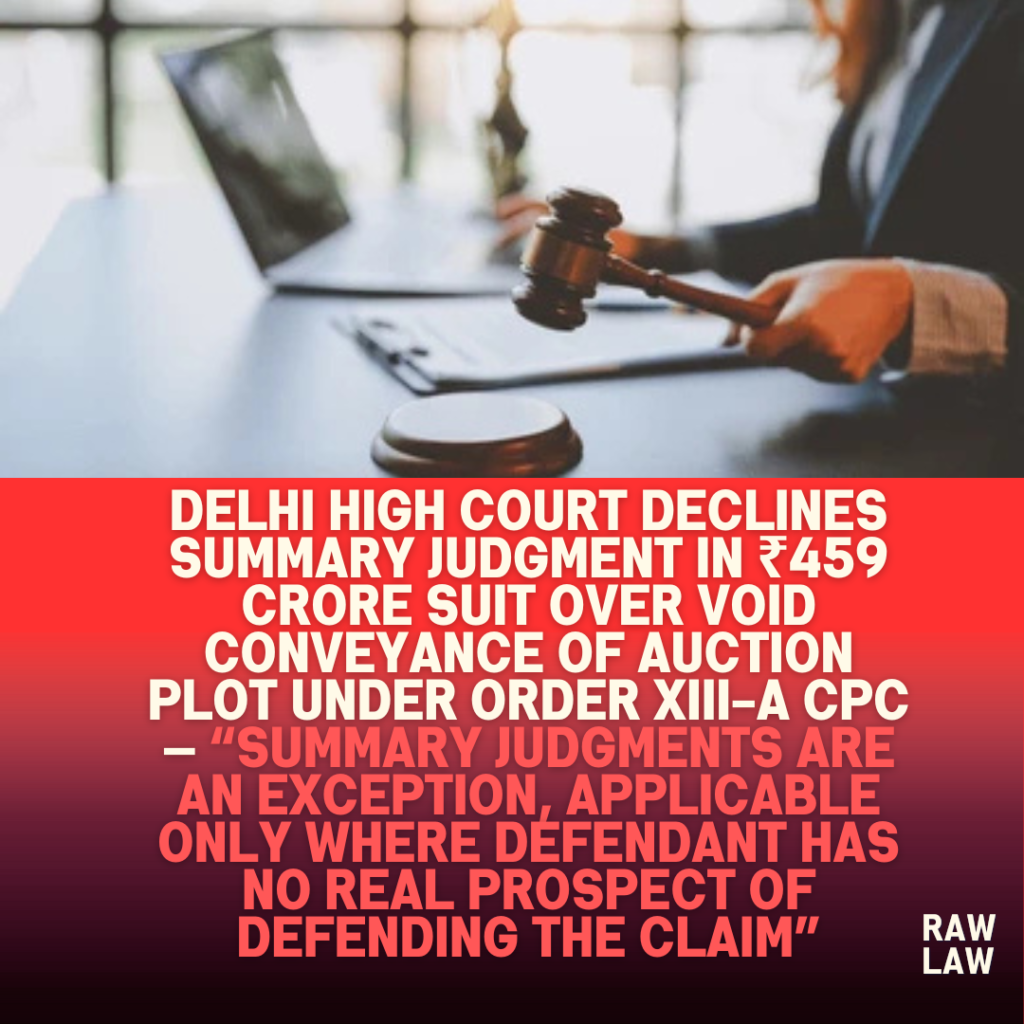Court’s Decision
The Delhi High Court, in its judgment dated 9 June 2025, declined to pass a summary judgment under Order XIII-A CPC in favour of the plaintiff, who sought a money decree of ₹459,73,61,098 against the Delhi Development Authority (DDA) for a failed land transaction. Justice Vikas Mahajan held:
“Without offering possession of the plot back to the DDA, or at least establishing that the rightful owner is already in possession… the plaintiff cannot claim refund of consideration amount paid by it.”
The Court concluded that material facts, particularly about the possession of the property, remain disputed and necessitate oral evidence, rendering the summary procedure under Order XIII-A CPC inappropriate.
Facts
The plaintiff had acquired a commercial plot at Jasola, New Delhi through a public auction conducted by the DDA in 2007, paying over ₹164.91 crore including documentation charges, stamp duty, and property tax. The conveyance deed was executed in 2008, and the plaintiff took possession of the plot.
However, the plot formed part of land originally owned by one Smt. Simla Devi. The acquisition of this land by the government under the Land Acquisition Act, 1894 was later declared lapsed by the Delhi High Court in a 2016 judgment, which was upheld by the Supreme Court in 2017. The DDA was given six months to re-acquire the land, which it failed to do.
The plaintiff claimed it was never informed of these legal proceedings, and that it was dispossessed of the plot in 2016 by unidentified persons allegedly linked to the original owner. Despite complaints and legal notices, DDA did not refund the sale consideration, prompting the plaintiff to file a suit for refund and seek summary judgment.
Issues
- Whether the plaintiff is entitled to a summary judgment under Order XIII-A CPC for refund of consideration after the land acquisition was declared void.
- Whether there exists a real prospect of the DDA defending the suit.
- Whether the question of possession needs trial and oral evidence.
- Whether the suit is barred by limitation.
Petitioner’s Arguments
The plaintiff argued that once the acquisition was quashed and the DDA lost title to the land, the conveyance deed became void and the DDA had no legal basis to retain the sale consideration. Relying on documentary evidence, including the Supreme Court’s order and DDA’s letter dated 20.11.2017 (acknowledging the lapse), the plaintiff contended that the suit was within limitation and there was no triable issue.
It was also submitted that the DDA had already deposited the principal amount pursuant to the Court’s interim order and the dismissal of the DDA’s SLP by the Supreme Court in 2024 reinforced the absence of a real defence.
Respondent’s Arguments
DDA contended that the plaintiff continues to be in possession of the land and cannot claim a refund without returning it. It argued that:
- The suit is barred by limitation, which involves mixed questions of law and fact.
- The issue of possession is highly disputed—while the plaintiff claims to have been dispossessed by trespassers, the DDA maintains the plaintiff still controls the plot.
- Necessary parties (i.e., the alleged dispossessors) have not been impleaded.
- Summary judgment is inappropriate given the existence of serious and contentious factual disputes.
Analysis of the Law
The Court analysed Order XIII-A of the CPC, as applicable to commercial disputes. Referring to Bright Enterprise Pvt. Ltd. v. MJ Bizcraft and Su-Kam Power Systems Ltd. v. Kunwer Sachdev, the Court reiterated that summary judgments are an exception, applicable only where the defendant has no real prospect of defending the claim and no compelling reason exists to proceed to trial.
It was emphasized that the standard for fairness is not whether the trial procedure is exhaustive, but whether the summary judgment gives the Court sufficient confidence to resolve the dispute without oral evidence.
Precedent Analysis
- Bright Enterprise Pvt. Ltd.: Summary judgment can only be passed after service of summons and before framing of issues. The decision cautioned courts to strictly follow the procedural safeguards under Order XIII-A.
- Su-Kam Power Systems Ltd.: Even disputed questions of fact do not preclude summary judgment if the court is satisfied that no real defence exists.
- Jayant Industries v. Indian Tobacco Company (Bom HC): Cited by the plaintiff to support the position that no trial is needed when rights are extinguished by law.
- Rockwool International A/S v. Thermocare Rockwool (India) Pvt. Ltd.: Cited by the defendant, reiterating the need for trial when factual disputes affect large financial interests.
Court’s Reasoning
The Court found that although the DDA’s title had lapsed due to the Supreme Court’s dismissal of its appeal, it could not be conclusively established on record whether the plaintiff had indeed lost possession to the original landowners or others. The Court held:
“Recording of oral evidence appears to be imperative as regards the issue of possession, which this Court finds to be contentious and triable.”
It emphasized that unless the plaintiff either returned possession of the plot or demonstrated that it was in fact already returned to the rightful owner, refund of the sale consideration could not be claimed.
Furthermore, the plaintiff’s failure to implead the alleged dispossessors and the absence of any legal action to recover possession also weighed against its claim.
Conclusion
The Court dismissed the plaintiff’s application for summary judgment, observing that the twin tests under Order XIII-A CPC were not satisfied. The matter would proceed to trial.
Implications
This ruling underscores that even in cases of apparent legal certainty—such as a void conveyance due to lapse of acquisition—summary judgment may be denied if factual uncertainties remain unresolved. It reaffirms that the Court must be cautious where public funds and large sums are involved, particularly when possession and title remain in dispute.
The matter is now listed before the Roster Bench for directions on 28 August 2025.
Also Read: Supreme Court Sets Aside Gawahati High Court Ruling in Railways’ Claim Dispute



